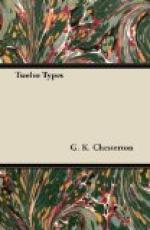THE OPTIMISM OF BYRON
Everything is against our appreciating the spirit and the age of Byron. The age that has just passed from us is always like a dream when we wake in the morning, a thing incredible and centuries away. And the world of Byron seems a sad and faded world, a weird and inhuman world, where men were romantic in whiskers, ladies lived, apparently, in bowers, and the very word has the sound of a piece of stage scenery. Roses and nightingales recur in their poetry with the monotonous elegance of a wall-paper pattern. The whole is like a revel of dead men, a revel with splendid vesture and half-witted faces.
But the more shrewdly and earnestly we study the histories of men, the less ready shall we be to make use of the word “artificial.” Nothing in the world has ever been artificial. Many customs, many dresses, many works of art are branded with artificiality because they exhibit vanity and self-consciousness: as if vanity were not a deep and elemental thing, like love and hate and the fear of death. Vanity may be found in darkling deserts, in the hermit and in the wild beasts that crawl around him. It may be good or evil, but assuredly it is not artificial: vanity is a voice out of the abyss.
The remarkable fact is, however, and it bears strongly on the present position of Byron, that when a thing is unfamiliar to us, when it is remote and the product of some other age or spirit, we think it not savage or terrible, but merely artificial. There are many instances of this: a fair one is the case of tropical plants and birds. When we see some of the monstrous and flamboyant blossoms that enrich the equatorial woods, we do not feel that they are conflagrations of nature; silent explosions of her frightful energy. We simply find it hard to believe that they are not wax flowers grown under a glass case.




